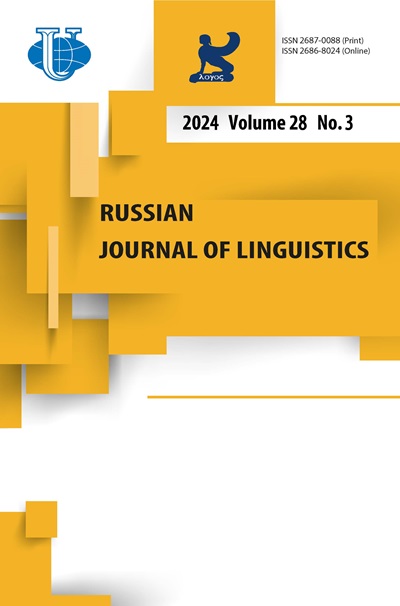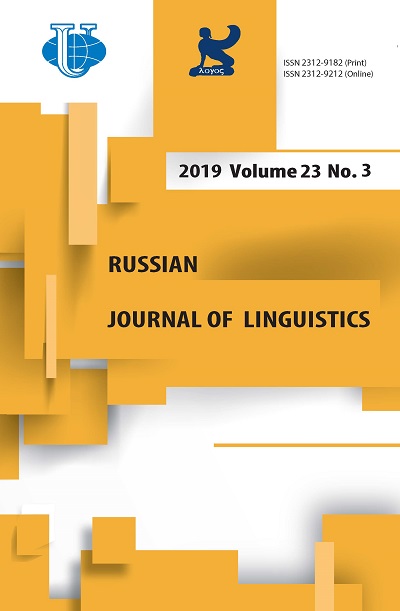Гастрономическая лексика как одна из особенностей нигерийского варианта английского языка
- Авторы: Борисова А.А.1, Эбзеева Ю.Н.1
-
Учреждения:
- Российский университет дружбы народов
- Выпуск: Том 23, № 3 (2019)
- Страницы: 820-836
- Раздел: Статьи
- URL: https://journals.rudn.ru/linguistics/article/view/21792
- DOI: https://doi.org/10.22363/2312-9182-2019-23-3-820-836
Цитировать
Полный текст
Аннотация
Парадигма «Мир английского языка» (World Englishes Paradigm) изучает различные вариантные проявления, которые характеризуются специфическими особенностями и изменениями вследствие контактов английского языка с автохтонными языками и культурами. История английского языка в Нигерии охватывает 500 лет взаимодействия очень разных культурных систем и цивилизаций. Языковые контакты между английским языком и коренными языками Нигерии привели к лингво-культурному и внутриструктурному разнообразию. Целью данной статьи является анализ гастрономической лексики нигерийского варианта английского языка, которая рассматривается в контексте влияния менталитета и культуры нигерийцев на их речевую деятельность. В центре внимания - заимствования из африканских языков (в основном йоруба и игбо), которые представляют собой неотъемлемый пласт культурно значимой лексики английского языка Нигерии и существенно обогащают его словарный состав. Материал для исследования извлекался из лексикографических источников, а также англоязычных художественных произведений нигерийских авторов. В ходе проведенного анализа были выявлены случаи вторичной номинации лексем, обозначающих флору Нигерии и нигерийскую кухню, их метафорическое употребление, а также их использование в сравнительных оборотах, фразеологизмах и паремиях. Исследование гастрономической символики в речи нигерийцев позволило проследить универсальные процессы использования общеупотребительных, близких повседневной жизни гастрономических лексем в качестве основы для символизации и сделать вывод о том, что гастрономическая лексика и создаваемые с ее помощью образы составляют один из ярких культурных кодов народа. Знание этой лексики играет важную роль в понимании этих кодов.
Об авторах
Анна Александровна Борисова
Российский университет дружбы народов
Автор, ответственный за переписку.
Email: borisova_aa@rudn.ru
аспирант кафедры иностранных языков филоло- гического факультета РУДН. Сфера научных интересов: язык и культура, межкультурная ком- муникация, языковые контакты, дискурс-анализ
Ул. Миклухо-Маклая, 10, корп. 2, Москва, Россия, 117198Юлия Николаевна Эбзеева
Российский университет дружбы народов
Email: ebzeeva_yun@rudn.ru
кандидат филологических наук, доцент, заведующая кафедрой иностранных языков филологического факультета РУДН. Сфера научных интересов: лексикология, язык и культура, языковые контакты, межкультурная коммуникация.
Ул. Миклухо-Маклая, 10, корп. 2, Москва, Россия, 117198Список литературы
- Алефиренко Н.Ф. Лингвокультурология. Ценностно-смысловое пространство языка. М.: Флинта: Наука, 2016. [Alefirenko, Nikolay F. (2016). Lingvokul'kurologiya. Tsennostno-smyslovoe prostranstvo yazyka (Linguoculturology. Axiological space of the language). Moscow: Flinta: Nauka. (In Russ.)]
- Арутюнова Н.Д. Язык и мир человека. 2-е изд., испр. М.: Языки русской культуры, 1999. [Arutyunova, Nina D. (1990). Yazyk i mir cheloveka (Language and the world of a human). 2 ed. Moscow: Yazyki russkoi kul'tury. (In Russ.)]
- Богданова Л.И Оценки и ценности в зеркале словарей русского языка // Вестник Российского университета дружбы народов. Серия: Лингвистика. 2017. Т. 21. No
- С. 729-748. [Bogdanova, Lyudmila I. (2017). The Reflection of Evaluation in Russian Language Dictionaries. Russian Journal of Linguistics, 21 (4), 729-748] doi: 10.22363/2312- 9182-2017-21-4-729-748.
- Германова Н.Н. Введение в языкознание. Язык в социокультурном контексте. М.: ИПК МГЛУ «Рема», 2017. [Germanova, Natalia N. (2017). Vvedenie v yazykoznanie. Yazyk v sotsiokul'turnom kontekste (Introduction to linguistics. Language in the social and cultural context). Moscow: MGLU “Rema”. (In Russ.)]
- Зыкова И.В. Коцептосфера культуры и фразеология. М.: Ленанд, 2015. [Zykova, Irina V. (2015). Kotseptosfera kul’tury i frazeologiya (Sphere of concepts and phraseology). Moscow: Lenand. (In Russ.)]
- Исмагилова Р.Н. Народы Нигерии. М.: Издательство Восточной литературы. 1963. [Ismagilova, Rosa N. (1963). Narody Nigerii (Peoples of Nigeria). Moscow: Izdatel'stvo Vostochnoi literatury. (In Russ.)]
- Исмагилова Р.Н. История Нигерии в новое и новейшее время. М.: Наука, 1981. [Ismagilova, Rosa N. (1981). Istoriya Nigerii v novoe i noveishee vremya (The history of Nigeria in new and contemporary times). Moscow: Nauka. (In Russ.)]
- Исмагилова Р.Н. История романных форм в литературах Африки / Институт мировой литературы им. А.М. Горького РАН. М.: Восточ. лит., 2010. [Ismagilova, Rosa N. (2010). Istoriya romannykh form v literaturakh Afriki (The history of novel in African literature) / Institut mirovoi literatury A.M. Gor'kogo RAN. Moscow: Vostochnaya literatura. (In Russ.)]
- Карасик В.И. Языковые ключи. М.: Гнозис, 2009. [Karasik, Vladimir I. (2009). Yazykovye klyuchi (Language keys). Moscow: Gnozis. (In Russ.)]
- Карасик В.И. Дискурсивное проявление личности // Вестник Российского университета дружбы народов. Серия: Лингвистика. 2016. Т. 20. No 4. С. 56-77 [Karasik, Vladimir I. (2016). Discourse Manifestation of Personality. Russian Journal of Linguistics, 20 (4), 56-77. (In Russ.)]
- Кочакова Н.Б. Традиционные культуры народов Нигерии. М.: ИАфр. РАН, 2008. [Kochakova, Natalia B. (2008). Traditsionnye kul'tury narodov Nigerii (Traditional cultures of Nigerian peoples). Moscow: IAfR. RAN. (In Russ.)]
- Лаптухин В.В. Пять тысяч километров по Нигерии. М.: Мысль, 1975. [Laptukhin, Viktor V. (1975). Pyat’ tysyach kilometrov po Nigerii (Five thousand kilometers from Nigeria). Moscow: Mysl'. (In Russ.)]
- Маслова В.А., Пименова М.В. Коды лингвокультуры. М.: Флинта: Наука, 2016. [Maslova, Valentina A., Pimenova, Marina V. (2016). Kody lingvokul'tury (Linguocultural codes). Moscow: Flinta: Nauka. (In Russ.)]
- Маслова В.А. Введение в когнитивную лингвистику. М.: Флинта: Наука, 2017. [Maslova, Valentina A. (2017). Vvedenie v kognitivnuyu lingvistiku (Introduction to cognitive linguistics). Moscow: Flinta: Nauka. (In Russ.)]
- Мечковская Н.Б. Общее языкознание. Структурная и социальная типология языков. М.: Флинта: Наука, 2009. [Mechkovskaya, Nina B. (2009). Obshchee yazykoznanie. Strukturnaya i sotsial'naya tipologiya yazykov (General linguistics. Structural and social typology of languages). Moscow: Flinta: Nauka. (In Russ.)]
- Найденова Н.С. Лингвистический анализ этноспецифического художественного текста. М.: Флинта: Наука, 2014. [Naidenova, Natalia S. (2014). Lingvisticheskii analiz ehtnospetsificheskogo khudozhestvennogo teksta (Linguistic analysis of an ethnospecific literature). Moscow: Flinta: Nauka. (In Russ.)]
- Нигерия. Справочно-монографическое издание / отв. редакторы И.Г. Большов, Т.С. Денисова. М.: ИАфр РАН, 2013. [Bolshov, Igor G., Denisova, Tatiana S. (eds.) (2013). Nigeriya. Spravochno-monograficheskoe izdanie (Nigeria. Reference book). Moscow: IAfr RAN. (In Russ.)]
- Прошина З.Г. Контактная вариантология английского языка. Проблемы теории. [Proshina, Zoya G. (2017). Kontaktnaya variantologiya angliiskogo yazyka. Problemy teorii. World English Paradigm (World Englishes Paradigm. The problems of theory). Moscow: Flinta: Nauka. (In Russ.)]
- Сапрыкина О.А., Найденова Н.С. Романские языки в Тропической Африке и постколониальный художественный дискурс. М.: Инфра-М, 2017. [Saprykina, Olga A., Naidenova, Natalia S. (2017). Romanskie yazyki v Tropicheskoi Afrike i postkolonial'nyi khudozhestvennyi diskurs (Roman languages in Sub-Saharan Africa and post-colonial discourse). Moscow: Infra-M. (In Russ.)]
- Чудинов А.П. Национальная ментальность и соответствующие ей метафорические модели. Landau: Verlag Empirische Padagogok, 2004. P. 19-30. [Chudinov, Anatoly P. (2004). National mindset and its metaphoric models. Landau: Verlag Empirische Padagogok, 19-30. (In Russ.)]
- Ajani, Timothy T. (2007). Is there indeed a Nigerian English? Journal of humanities and social sciences, 1 (1).
- Bamgbose, Ayo. (1998). Torn between the norms: innovations. World Englishes, 17 (1), 1-17.
- Banjo, Ayo. (1995). On codifying Nigerian English: Research so far. New Englishes: A West African Perspective. Ibadan: Mosuro Publishers, 203-231.
- Crystal, David A. (1997). English as a Global Language. Cambridge: Cambridge University Press.
- Crystal, David A. (2006). How Language Works. Pinguin Books Ltd.
- Firth, John Rupert. (1956). Descriptive linguistics and the study of English. Selected papers of J.R. Firth, 1952-1959 / Ed. by F.R. Palmer. Bloomington: Indiana University Press, 96-113. Reprint: World Englishes: Critical Concepts in Linguistics / Ed. by K. Bolton and B. Kachru. (2006). Vol. 3. London/New York: Routledge, 203-217.
- Gladkova, Anna and Larina, Tatiana (2018). Anna Wierzbicka, Words and the World. Russian Journal of Linguistics, 22 (3), 499-520. doi: 10.22363/2312-9182-2018-22-3- 499-520.
- Gladkova, Anna and Larina, Tatiana (2018b). Anna Wierzbicka, Language, Culture and Communication. Russian Journal of Linguistics, 22 (4), 717-748. doi: 10.22363/2312- 9182-2018-22-4-717-748.
- Goddard, Cliff and Anna Wierzbicka. (2014). Words and Meanings: Lexical Semantics Across Domains, Languages, and Cultures. Oxford: Oxford University Press.
- Kachru, Braj (2006). World Englishes and Culture Wars. The Handbook of World Englishes. London, 450.
- Kecskes, Istvan (2014). Intercultural Pragmatics. Oxford: Oxford University Press.
- Larina, Tatiana V., Ozyumenko, Vladimir I., Kurteš, Svetlana. (2017). I-identity vs we- identity in language and discourse: Anglo-Slavonic perspectives. Lodz Papers in Pragmatics, 13 (1), 195-215.
- Schnurr, Stephanie, Zayts, Olga (2017). Language and Culture at Work. Routledge.
- Wierzbicka, Anna (2003). Cross-Cultural Pragmatics. 2nd ed. Berlin: Mouton de Gruyter.
- Wierzbicka, Anna. (2006). English: Meaning and Culture. Oxford: Oxford University Press.
- Wilents, Gay. (1992). Binding Cultures. Black Women Writers in Africa and the Diaspora. Indiana University Press.
- Achebe, Chinua. (1958). Things Fall Apart. Oxford: Heinemann.
- Adichie, Chimamanda Ngozi. (2004). Purple Hibiscus. London: Fourth Estate.
- Adichie, Chimamanda Ngozi. (2006). Half of a Yellow Sun. London: Fourth Estate.
- Adichie, Chimamanda Ngozi. (2009). The Thing Around Your Neck. London: Fourth Estate.
- Adichie, Chimamanda Ngozi. (2013). Americanah. USA: Knopf.
- Atta, Sefi. (2010). Swallow. USA: Interlink Pud Group.
- Nwapa, Flora. (1966). Efuru. Oxford: Heinemann.
- Okoye, Ifeoma. (1982). Behind the Clouds. UK: Longman.
- Shoneyin, Lola. (2010). The Secret Lives of Baba Segi’s Wives. London: Serpent’s tail.
- Awde, N., Wambu, O. (1999). Igbo-English / English-Igbo Dictionary & Phrasebook. Hippocrene Books, (U.S.) N.Y.
- Igboanusi, H.A. (2002). Dictionary of Nigerian English Usage. Ibadan, Nigeria.
- Killam, D., Ruth, R. (2000). The Companion to African Literatures. Indiana, James Currey.
- Oyeleke, C., Mawadza, A. (2019). Yoruba-English/English-Yoruba Dictionary & Phrasebook. (U.S.) N.Y. Hippocrene Books Inc.

















